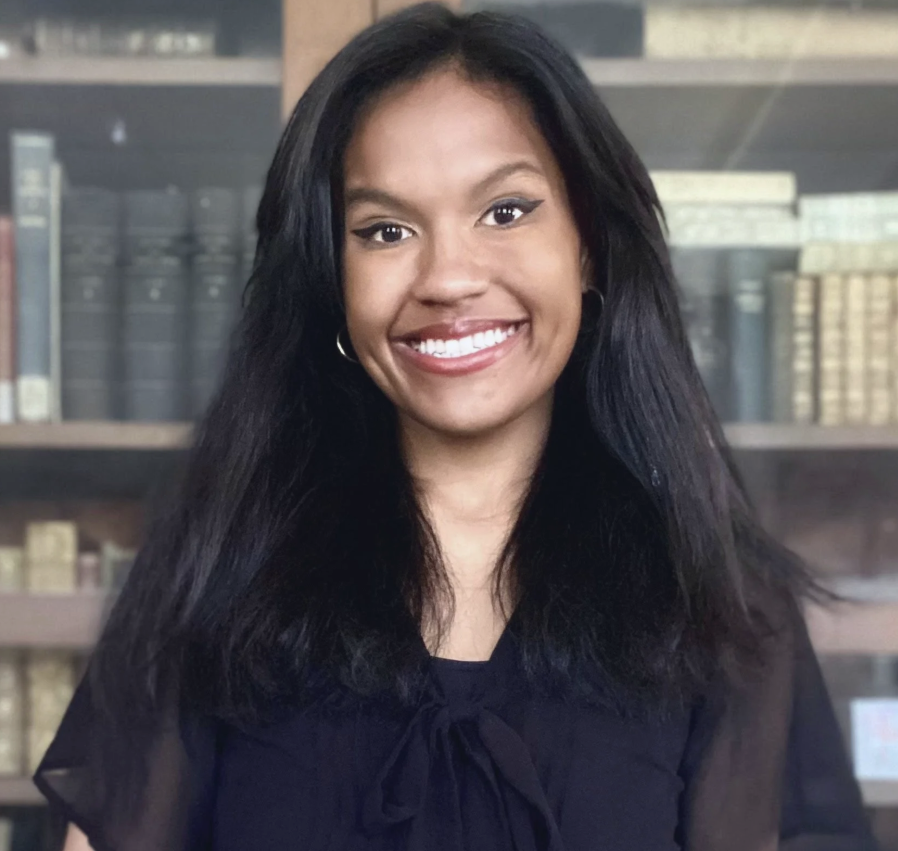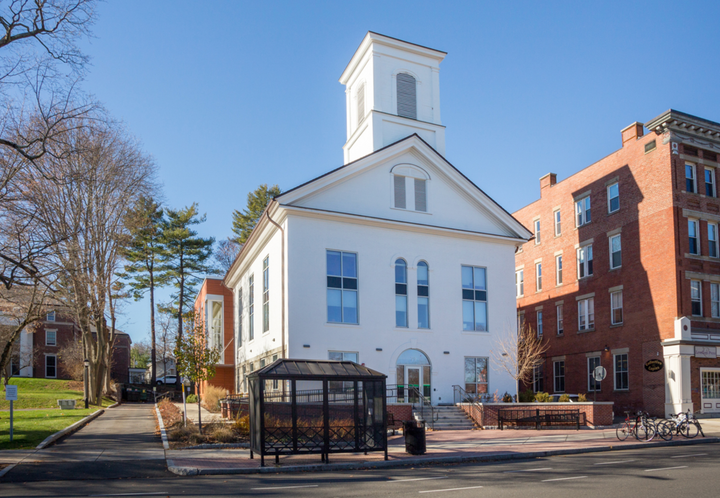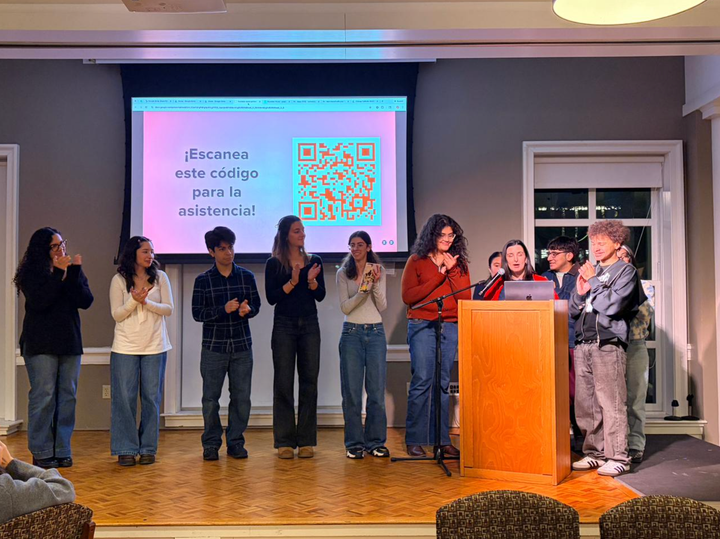Fresh Faculty: Amber Sweat
Amber Sweat is an assistant professor of French. Managing Features Editor Nife Joshua ’26 and Assistant Features Editor Belaine Mamo ’27 sat down with her to speak about her research on film and Black coming of age, adjusting to the Northeast, and her Balinese cat, Genevieve.

Q: What did you study in undergrad, and how did you decide on your area of study?
A: I went to the University of Texas at Austin and started as a neuroscience major. It was technically biology, but they had tracks — I picked neuroscience. I always had French on the side, so I knew I would be a double major. My goal, for a long time, was to go to medical school … [to] be an OB-GYN and work for Doctors Without Borders. So, I always conceptualized French as helping me in public health or global medicine.
[UT Austin] was a very big school: “Intro to [Biology],” no exaggeration, had to have been at least 300 people. There were classes where you sat on the ground because there just weren’t chairs.
I was also first-generation. No one went to college in my family. There were a lot of resources I just didn’t know how to look for. The sciences were really hard. A fun fact about me: I was on academic probation my first year, for a lot of different reasons. The adjustment to college was just hard, and sometimes you lose your footing. I did not do great my first year, but they didn’t kick me out. I stayed, but I knew something had to change.
I was in the equivalent of French 2 when I started college [and] I kept finding myself just wanting to do my French homework. I really enjoyed the formulas of French, but also that there are parts based firmly in communication. French 2 was also my smallest class — I think it had 10 people in it, who are still my friends to this day.
[Still], I cycled through a lot of other majors. I tried international relations for a bit. I did history for a while. I was in Middle Eastern studies and Africana Studies for a while, but I ended up being a sole French major. I find French majors just kind of happen. You’re like, “Oh, I have all the credits … I’ll just do it.” But I credit all those other fields in helping me cultivate an identity. I just finished an article that has to do with microchimerism, which is when a fetus’s DNA goes to the mother. What does that do for our ideas of chronology? It comes up sometimes in Black diasporic texts.
[As] a junior in college doing mentorship programs, I realized how much I liked teaching. So, I started to think, “What if I became a teacher?” My goal became to be a high school teacher — that dream really carried me through the major.
I wrote an honors thesis, which was also a process in and of itself. I loved Simone de Beauvoir, and I was really rooted in this type of feminist theory.
Q: Growing up in Texas — do you think that had any influence on you first choosing neuroscience as a major?
A: Absolutely. As troubled as the state is, I am a proud Texan. My dad’s from Texas, and we come from enslaved peoples, so our lives are in Texas. And my mom immigrated from the Philippines. I think what had an influence, maybe more so than Texas, was my class background.
Being first-generation was really important. Neither [of] my parents went to college. My sister went, and I was next. There’s this feeling of “my parents worked really, really hard, so I need to go and do something.” I always fantasize about paying Mom and Dad’s mortgage. So when I started to go through those moments of “I don't think this is for me,” it was really, really hard.
I’m incredibly grateful because my family was always very supportive. They were also very intent on “We just want you to get an education.” But that did drive my choice [of] major. And growing up in Texas, the humanities and arts funds were limited. There was always the question of will we even have a French teacher this year? — It’s just not promised.
I had been taught there are ‘real jobs, and not real jobs. Beyond the family responsibility, there was the sense that studying French is not a real job. However, U.T., as much as I struggled in it, was a great place to be. I met a lot of different people, and they changed the way I thought.
Q: What was your journey to and in graduate school like?
A: When I realized how much I loved teaching and researching, my undergrad advisors suggested professorship. My knee-jerk reaction was like, “I don’t have money to go to grad school. That’s not a possibility.” That’s also when I learned that Ph.D.s are paid for, which is a fact a lot of people don’t know either. I decided to give it a shot, applying straight to Ph.D. programs. The French department at U.T. was kind enough to give me a scholarship for a gap year. In the fall semester, I interned at the Sorbonne, and in the spring, I started [Teaching Assistant Program in France] (TAPIF), my teaching assistant year. I lived in the banlieues of Paris and got really close to the diaspora. Most of my friends, and [my] high school students, were from North and Western Africa. I consider it the most educational year I’ve ever had.
[Because] I had this incredible experience in the banlieues, I thought there [were] a lot of uninvestigated intersections in French studies. Berkeley felt like a place where I could explore things I hadn’t yet as an academic.
My qualifying exams were on childhood. I started to be concerned with the processes of becoming an adult. There’s an excellent scholar, Habiba Ibrahim, who talked about coming of age for Black girls — they tend to be adult-ified as children, and as adults, infantilized. I explored those processes of “becoming” in Francophone literature, and wrote my dissertation on Black girl coming of age and Francophone media — how Black girls come of age in the screen age, and what it means to do so in an era where you're always seen, especially when the technologies tend to be racially coded. What I argue for is that, traditionally, we lose sight of our bodies and ourselves in the screen age. It’s an existential crisis for a lot of people.
Instead of the separation of the body, which tends to be a very Western or Cartesian way of thinking that authors did, some filmmakers did something different, where there’s actually a return to the body. It happens through the visual, the haptic, and the sonic. That’s where the class, “Skin: Film and Race”, was born!
Q: You mentioned that UT is where you decided to study French, but you discovered and developed your place in the field more while in California. Could you go into that a little bit more, and also the adjustment?
A: In California, I actually had a lot of different plans. Since professorship is hard to get, you have to. But I was conceptualizing it as "What do I want to teach?” I had a really wonderful professor who said, “What do you want to share?” I taught French 1, 2, and 3, a bunch of first-year seminars (which grad students teach), and I taught an upper-division class. Explaining French in different countries, and watching students go, “Wow,” — it's the same experience I had in college, but being on [the other] side of the classroom felt special. I started to make notes of these moments. People reacted to “La Noire de,” which I teach in almost every class, because it’s fascinating. I think Berkeley did a lot of great things, but one thing it does exceptionally well is teach you how to teach. That’s where I felt the future of French studies made the most sense to me. You realize that this is honest work, it is worthwhile. So, if Texas is where I discovered I loved French, California is where I really discovered I loved teaching.
Q: Could you speak about what attracted you to Amherst? You mentioned earlier that the small size of your French classes is what you really loved at U.T. Austin. Do you think this inspired your path to Amherst, even after the seven years between U.T. and coming here?
A: I went on the job market this time last year. I was so lucky to talk to a lot of different schools and faculties — I had a good time. Amherst was the first job offer I got, and it was the first visit I did.
I absolutely remember looking at The Student — shout out to The Student! I did read it while prepping for my visit — I thought the thesis column, “Thoughts on Theses,” was really cool. When I visited [Amherst], part of the visit [was] a mock class … and you get to meet the faculty. I think that what is really telling is how faculty talk. So if you ask, “What’s the hardest part?” or, “What’s your day-to-day look like?” They’re blunt, they’ll tell you, “Hey, research is heavy” or “X, Y, Z.”
I remember when I visited Amherst, the entire French department, you could see it in their faces: It’s the best job in the world. When I pushed further, they were like, “The students are unreal.”
It feels like critical thought and discussion really come to life here in a sincere way. I remember thinking, “These people really love teaching.” Having gone through grad school with teaching at the center of everything, it felt matched here. I remember at dinner, they were naming students, and saying, “Oh yeah, that’s the person who wrote the thesis on this. Their third chapter was this…” Watching them be able to hold onto that and talk about students as people was so enlightening.
When I got the job offer, I cried and immediately told my cat, Genevieve, “Your life’s about to change.” The faculty were happy, the students were happy. That’s not always promised.
The feeling absolutely ties to the small class size. College education becomes a dialogue, as opposed to talking at people. Even for the past two weeks since I arrived, I say, “Y’all make my job so easy.” It’s a lot more facilitation than lecturing, which has been a shift for me.
People have, really understandably, said, “It’s small, we know there’s not a lot to do,” [but] I’m having the time of my life. I look out my window, and I see all these faculty children all in their strollers, and we know each other. It’s really so social, and it feels like such a massive community. My neighbor gave me a bunch of bounty from their garden the other day: They knocked on my door, and just put bitter melon in my arms. I could go on and on about how thrilled I am to be at Amherst. Let’s see how winter goes with the snow, but for now, it’s been really incredible.
Q: What are some of your own hobbies or interests, and what are you hoping to discover around the area?
A: I’m an avid runner. I would love to qualify for Boston one day. We’ll see if my knee allows. I really like rock climbing. I did that a lot in California and just got back into it. I love bicycling as well. I’m an outdoorsy person.
I've been deeply inspired by how much people garden here. I feel like everyone has a garden. I’ve never had a green thumb, but maybe it’s time. I promised my neighbors that I would make flowers in exchange for their bountiful veggies. I also heard The Drake was cool. And, of course, the farm — I can’t wait to buy vegetables. Shout out, Book and Plow! Whenever y’all are outside of Frost, I will be there.
I still need to explore the Five Colleges; that will probably take some time, but over the years, I would really like to make those connections. I love the farmers’ market. There’s a faculty member who has a flower stand there. I need to go patron that.
Q: In our class, “Skin: Film and Race,” we’ve read some theory and also gotten into narrative literature. I’m wondering how you balance those two kinds of study when you’re researching, because sometimes it almost feels like two different parts of your brain.
A: That’s a very, very good question. You have the theoretical productions — based in sociopolitics or ideology — the history, and then these aesthetic works like novels, literature, [and] film. But these talk to each other because texts are generated [from] a time. I have always thought it’s important to read them in their time, and also weirdly outside of time. These things don’t necessarily exist suspended in an era. They always have afterlives. We talk about colonialism, but what about [post-colonialism]?
I think what aesthetic productions do, especially placed next to theory or history, is patch gaps in narratives — “history is written by the winners” is a quote you hear often. In independent publishing and filmmaking, people express an experience that might not have been recorded in an archive. They all speak to, and have to be read alongside, each other, because they’re concurrent.
So, they balance each other. If you dig deep into theoretical texts, they tend to point to the aesthetic text you can think through to understand the theory. They are often thought of as diametrically opposed, but they’re always in conversation with one another. I also think it’s really fun to work with film. To see, hear, and feel alongside a text helps it become more applicable.
Q: What inspired your teaching style and sharing Tea Time with students?
A: I think you have to, especially in a language, have the radical knowledge that you do not know everything. That's one thing that a lot of Ph.D.s experience at the end is, I don’t know anything. You become an expert in something. But there’s something incredibly freeing about realizing how much you don’t know.
I pair that with the fact that I do work on coming of age. And something that I’ve learned a lot in my studies on youth is [that] they are postured often as “non-epistemic subjects.” What that means is we tend to think of youth as people who don’t know a lot. That could not be further from the truth. Children know a lot. Young people are at the helm of a lot of revolutions. Youth have always been the purveyors of culture, girls, especially.
I think that drives a lot of the way I think about teaching. I like my classroom to be a space where I’m the guide and the professor. I’m there for reflection and to give context and breadth, but truly, the best comments come from other students. Those connections are really important to foster.
And, Tea Time. We’re all humans. In the French classroom, I think it’s also important because if our seminars are in French, we tend to lose personality. People tend to be nervous. This is all very normal in a foreign language. So, Tea Time I enjoy because you get to learn more about each other. I like to think of you as co-conspirators. Another thing I loved about Amherst was how much people co-published with students and saw them as budding colleagues. Tea Time is a way to facilitate that.
Q: It hasn’t been long since you were a student, graduating a couple months ago. Do you have any advice for students who are looking to do future research, or just students in general?
A: The number one thing that I always tell people, no matter where you go to college, just ask for help. Especially here at Amherst, the resources are incredible, and we want to help. Seek mentorship wherever you can find it. And truly, it gets better. That’s my universal advice for people in school.
Be curious, especially with the open curriculum, do things you don’t really think you’d want to. Find ways to make your curiosity speak to future plans, if you must. But you’re here to learn how to think. The job market’s mortifying, I understand that, but benefit from the curriculum being the way that it is — give yourself some breathing room.
For theses, if you’re gonna write one, the seeds don’t necessarily come from a classroom. Sometimes it’s something you notice in your day-to-day life. Research is a lot more than a thesis, and what interests you is going to be very connected to who you are as a person. Research is almost autobiographical. You’re always asking something about yourself when you’re doing it, so lean into that to be aggressively human.
Have fun and sleep, sleep, sleep. Don’t glamorize the grind that much. Work hard, but Maslow’s hierarchy of needs … pay attention to it.
Q: What are you looking forward to, in regards to research, teaching, or just for fun?
A: Something that I like about the faculty here is that I have been really encouraged to keep learning, which is something that unites a lot of faculty: We just like to learn. I’m excited to keep learning forever. There are a lot of support groups and faculty who want to talk about what they do, so I'm excited to learn more.
I really want to get back into comp[uter] sci[ence]. I learned how to code Python two summers ago, since I work on new media a lot. My computer didn’t work the same after [that], so I probably broke it, but I’d like to learn again.
What I’m really excited to do is write my book. I’m really taken up with this idea of interface as of late, which I think is an applicable term to a lot of what I work on. We talked about skin as interface, bodies as interface. And then, of course, I have this interest in film, screens, and media, which are also a type of interface. I know that I want to stay rooted in this world of race and representation in the Francophone world, because I do think it’s untapped.
I already have ideas for teaching next school year. I’d love to teach [about] sports, like soccer, but sports as a cultural barometer. I also think a lot about music — I had a class once on hip hop, and often think of returning.
I’m also really excited to get an identity at Amherst. I think I’m still so new, and one of my [faculty] friends described us as “student-passing faculty.” Learning how to root yourself will be fun, but as of now, it’s already wonderful. I’m excited to just see where it goes. I plan on being here forever, hopefully. Amherst makes it easy. My students make it easy to get excited about that.





Comments ()